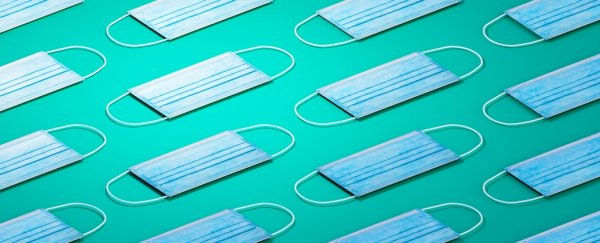The COVID-19 pandemic is by no means over, but as time goes on, scientists are learning more and more about the virus – and the various ways that we can protect against it, including new and improved face masks.
A new membrane-based respiratory mask developed by researchers can capture and deactivate SARS-CoV-2 spike proteins as it comes into contact with them. These spike proteins are what allow the virus to enter host cells once they're in the body.
As per tests, almost 99 percent of targeted airborne particles can be filtered out by the new mask, giving wearers a vital extra layer of protection when it comes to avoiding infection.
"This new material can filter out the virus like the N95 mask does, but also includes antiviral enzymes that completely deactivate it," says chemical engineer Dibakar Bhattacharyya from the University of Kentucky.
"This innovation is another layer of protection against SARS-CoV-2 that can help prevent the virus from spreading."
After developing the membrane with a manufacturer, the researchers tested it using SARS-CoV-2 spike proteins that had been immobilized on synthetic particles. It was able to stop coronavirus-sized aerosols from getting through while also destroying the spike proteins within 30 seconds of contact.
The membrane can be tweaked in terms of its thickness and porosity, leaving open the possibility of further improvements in the future. It means the type of particles filtered out by the membrane can be carefully controlled.
According to the team, a mask using this membrane could be worn for two hours a day for several days without affecting breathability. That means masks don't have to be replaced as often, so fewer used masks need to be disposed of over time.
"The innovative development of smart filtration materials with low airflow resistance that can filter, capture, and deactivate aerosolized virus particles can provide immense human health and industrial workplace benefits," write the researchers in their published paper.
The protection factor offered by the new mask is higher than the N95 mask standard, which is certified as being able to filter out 95 percent of particles (hence the name). N95 masks have three or four fiber layers, plus an electrically charged filter layer.
Right now, the N95 mask is the most commonly used in the healthcare industry, though there's still room for improvement. With their new mask, the researchers got to 98.9 percent for 100 nanometer aerosol particles (including those carrying SARS-CoV-2).
What the researchers don't say is how long it's going to take to get this material from the lab into masks that you are actually able to go out and buy – though considering how effective it promises to be, we're hoping it's sooner rather than later.
"The use of respiratory face masks provides significant reduction of coronavirus spread, as viral spread has been proven to occur primarily via two modes of transmission: droplet spread and inhalation of infectious airborne aerosols," write the researchers.
The research has been published in Communications Materials.
